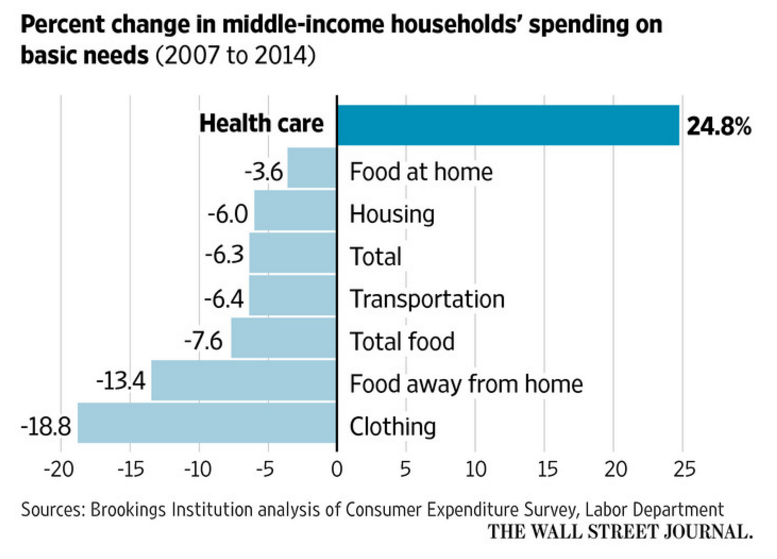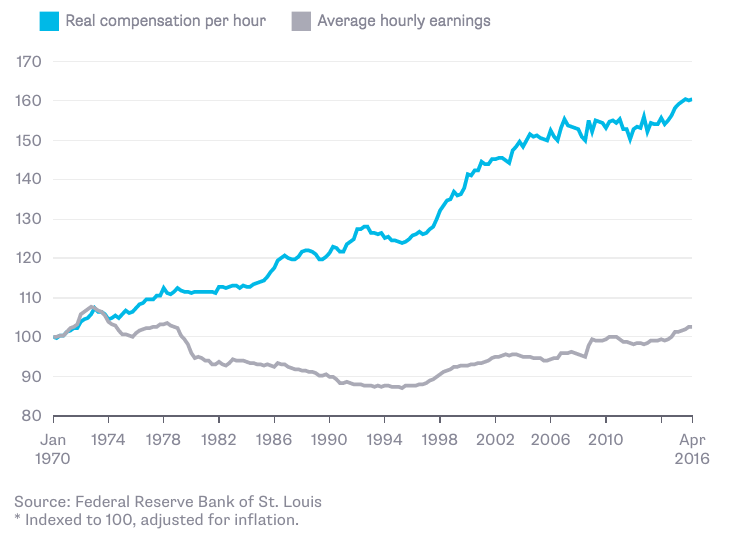Hyper-inflating healthcare costs create enormous collateral damage.
Even if healthcare isn't your issue, hyper-inflation takes from your issue.
Rising healthcare costs are the primary cause of wage stagnation in the middle class.
Employers spend more on payroll than ever, yet it's been reported that 80% of all payroll increases over the last 20 years have gone to healthcare costs. For a specific example, 100% of a recent pay raise for teachers was consumed by healthcare costs.
As a result, nearly 7 in 10 Americans have less than $1,000 in savings. (link)
Both employees and employers (public and private) bear the burdens of huge premium increases.

The Washington Post, New York Times, Wall Street Journal, and Time have all reported on how rising healthcare costs cause wage stagnation and middle class incomes to fall. An image from a recent Bloomberg article really drives this point home.

Baby Boomers could have saved $1,000,000 more for retirement.
Here's the simplified version of how.
- Assume that for the last 30 years, healthcare prices had increased at the average rate of inflation
- Assume the extra money not spent on healthcare had gone to wages and was invested in an S&P 500 index fund (reinvesting dividends)
- Over 30 years, the average American household would have had an additional $1M in retirement savings.
Where are baby boomers instead? $136,200, plus the average baby boomer couple will have $300,000 of healthcare expense not covered by Medicare.
It's estimated that in 2013 the top 30 US cities have $100 Billion in unfunded retiree healthcare benefits and states have $627B.
Our system crushes the doctors, nurses, social workers, other professional caregivers, and our loved ones we rely on for care.
Doctors
- 9 out of 10 physicians across the country are unwilling to recommend the profession to others
- More than 50% of physicians have at least one indicator of burnout and 45% of primary care docs would quit if they could
- Doctors are leaving residencies in record numbers
- Studies show that doctors spend immense amounts of time on admin and non-patient facing work, with one study finding that for every hour physicians provide direct clinical face time to patients, they spend nearly 2 more hours on EHR and desk
Nurses
- Over one third of nurses have high burnout levels of emotional exhaustion
- It is not uncommon for nurses to be "on" for 13-15 hours at a time
Loved ones
- It's commonly accepted that navigating the system on behalf of an aging parent or loved one is a nearly impossible task
If costs increase at half projected rates, $1.9M of Millennials' $3.8M lifetime earnings could go to healthcare.
There are lots of examples, but David Goldhill's from his book Catastrophic Care drives the point home. His example uses a hypothetical Millennial named Becky to show how $1.9M of her lifetime earnings could go to healthcare. Learn more.
Healthcare payments visible to Becky
| Her share of insurance premiums | $353,174 |
| Deductibles/out-of-pocket expenses | $97,465 |
| Medicare taxes | $55,831 |
| Medicare premiums | $63,690 |
| Total | $570,160 |
Healthcare payments hidden from Becky
| Employer premiums | $957,446 |
| Employer Medicare taxes | $55,831 |
| Federal taxes | $300,588 |
| State taxes | $40,478 |
| Total | $1,354,586 |
Grand total: $1,924,746
It steals from education, public safety, infrastructure, and other public services.
Federal spending
- In 1976, healthcare consumed 7% of the federal budget. Today it consumes 27%.
Education
- Bill Gates gave a Ted Talk on the effect on education of broken state budgets, finding that healthcare costs are the primary cause
- Healthcare costs drain school and education budgets, resulting in fewer teachers/larger class sizes, lower wages for educators, and fewer school programs
Other public services
- Healthcare costs cause cities to delay public works projects, resulting in potholes, crumbling infrastructure, and more
- Healthcare is the second largest category of state budget spending (behind education), but healthcare benefits costs are increasingly consuming greater and greater portions of other budget categories
- As Dr. Jeff Brenner (MacArthur Genius Grant winner) outlined, cities have passed a staggering amount of revenue-bonds for hospitals that citizens will pay for over the course of a generation. Yet, some say we already have 40% more hospital beds than we need and closing hospitals appears to have no effect on health outcomes.
Pensions
- At the intersection of retirement savings and public services are public employee retiree healthcare benefits deficits, which were $627 billion in 2013 for just state employees.
As the former Chair of the US President’s Council of Economic Advisers said during the debt crisis, “we don’t have a debt problem…we have a healthcare problem.”
Hyper-inflation's ripple effect impacts nearly every social issue.
It is the (often unspoken) elephant in the room of nearly every resource allocation discussion. Often, this is directly as a result of allocating more and more financial resources to healthcare. Other times it is indirectly by limiting the availability of intellectual, political, and financial capital for other causes.
Here are just a few areas we've seen impacted.
- Education
- Public safety
- R&D spending
- Job creation
- Globalization
- Climate change
Hyper-inflating costs create direct and indirect healthcare “taxes” that keeps individuals and other communities from addressing other societal problems.
Confidentially tell your story of how the healthcare status quo has stolen from you.
The good news is many solutions already exist!
Take the pledge
Put aside tired, partisan cliches to advance pragmatic solutions, no matter who pays.
We need all Americans together to fix it.
No spam. We promise.
